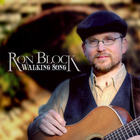Considering that bluegrass band lineups are, and have always been, famously fluid entities, it only makes sense that the pivotal role Ron Block has played in contemporary acoustic music’s premiere ensemble for more than two decades would be one of the accomplishments for which he’s most widely recognized.
Aside from the front woman herself, Ron’s tenure in Alison Krauss & Union Station is second only to that of bassist Barry Bales, and not by much (Ron joined in 1991, Barry the previous year). As a member of Union Station, Ron has played banjo and guitar with a consummately sympathetic blend of virtuosity and melodic finesse on some of the world’s biggest stages, as well as on recordings that have proven to be pop culture touchstones and Grammy® magnets. Besides the ample evidence of his tasteful, disciplined musical intelligence within that body of work, the compositions from his pen number in the double digits and include some of the most indelible gospel material to which Alison has lent her unparalleled voice.
Outside of Ron’s primary band, neotraditional country superstars, family gospel groups, ruminative singer-songwriters, rootsy storytellers and jazz instrumentalists have sought his contributions as a banjo and guitar player, singer, songwriter and producer, calling on his fluency in a wide array of musical vernaculars. The credits he’s accumulated are world-class to be sure, but they add up to an incomplete portrait of his musicianship; Ron is a fully rounded artist in his own right.
It’s on his solo albums – first the devotionally themed collections Faraway Land and DoorWay and now the exhilarating Walking Song (released at six-year intervals, and worth the wait) – that he’s fleshed out his voice and vision, not to mention revealed himself to be one of the most imaginative and theologically sophisticated thinkers in the whole wide acoustic world.
There’s a decent chance that Ron is the only bluegrass songwriter who’s ever found an important new collaborator while engaging in an intellectually rigorous online discussion about creativity and spirituality. After striking up a virtual friendship that way, he and poet, teacher and first-time songwriter Rebecca Reynolds made the leap into long-distance, Skype-enabled co-writing. The resulting 11 originals among these 14 tracks prove that their risk was a truly inspired one.
“She gave me the freedom to fail,” he marvels. “We were sitting there having a good time and writing a song, and there was no pressure. And if we didn’t come up with anything, it wasn’t a big deal. We didn’t waste the time; we learned something. At my age, to feel like I’m just beginning to understand what it means to write songs, that’s a gift. It’s a newness all over again.”
“Sometimes,” as Rebecca elaborated in an email, “we would start with an image and hit ‘record’ on his laptop. I would say, ‘What does the ocean feel like? Play it until I can hear it.’ Or the Irish countryside. Or the snow. I would close my eyes, and narrate what I saw, and he would start playing, and then I would be quiet, and he would just take off and finish it. He can play an entire world until you can feel it around you.”
Or hear it. You’ll find that Ron has composed and arranged his way across centuries of folk and popular lineage with his nuanced knowledge and modern ear, putting his playful spin on Celtic balladry, old-time romps, soul-searing Appalachian modal melodies, nimble folk tunes, tradition-steeped bluegrass, groove-driven newgrass and contemporary singer-songwriter fare. The music finds a perfect match in Rebecca’s elevated use of imagery and rhyme, her strikingly poetic, period-appropriate word choice and their shared interest in writing songs that speak to a rich range of human experience, the fun, fervent and contemplative moments alike.
It’s hard to imagine a singer sounding any more natural than Ron does delivering these lines, his phrasing crisp and his timbre light and warm. That’s to say nothing of the eloquent communicating he does with his hands; for him, playing is “a means of helping the song say what it wants to say.” And, for the first time, he’s playing all of the guitar and banjo parts, from the lighthearted solo runs laced through “Ivy” to the deliciously droll licks that give “Sunshine Billy” its spunk and the soulful simplicity he brings to an instrumental reading of the hymn “What Wondrous Love Is This.”
As for Ron’s accompanists, they’re every bit the dream team you’d expect from a picker/singer/songwriter of his stature: Sam Bush, Mike Compton and Sierra Hull on mandolin, Stuart Duncan on fiddle, Jerry Douglas and Rob Ickes on Dobro, Barry on bass and no less than Alison, Dan Tyminski, Kate Rusby and Suzanne Cox singing harmony. Those familiar with the lineup of Union Station will read that abbreviated list of guests and know that it means sometime between the opening and closing notes, everyone in Ron’s longtime band gets a chance to back him while he does his own, singular thing.
“I feel like this is the path I’m supposed to be on,” he says. “I feel like I can have the career of playing with the band and have this creative outlet where I’m not in a role, where the playing field is wide open because I’m making a solo record. For a long time, I thought the role was all there was to me.”
Really, nothing could be further from the truth. Walking Song is the work of a multi-faceted artist in his element.
– Jewly Hight, Nashville, TN, April, 2013
